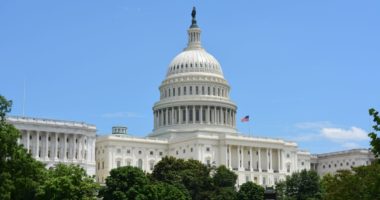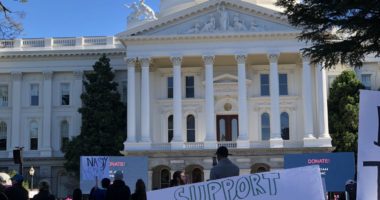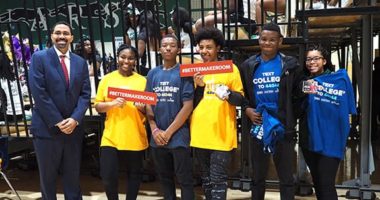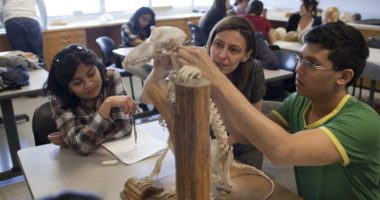Higher Ed Leaders Call on Congress to Protect and Strengthen the Pell Grant Program
The Honorable Thad Cochran
Chairman
Senate Appropriations Committee
Washington, DC 20510
The Honorable Rodney Frelinghuysen
Chairman
House Appropriations Committee
Washington, DC 20515
The Honorable Roy Blunt
Chairman
Senate Labor-H Approp. Subcom.
Washington, DC 20510
The Honorable Tom Cole
Chairman
House Labor-H Approp. Subcom.
Washington, DC 20515
The Honorable Patrick Leahy
Ranking Member
Senate Appropriations Committee
Washington, DC 20510
The Honorable Nita Lowey
Ranking Member
House Appropriations Committee
Washington, DC 20515
The Honorable Patty Murray
Ranking Member
Senate Labor-H Approp. Subcom.
Washington, DC 20510
The Honorable Rosa DeLauro
Ranking Member
House Labor-H Approp. Subcom.
Washington, DC 20515
Dear Chairmen and Ranking Members,
As presidents and chancellors of institutions committed to serving low-income students and students of color, we believe it is imperative that you strengthen and invest in the Federal Pell Grant program in the FY18 appropriations cycle.
The Federal Pell Grant program is the foundation of student aid for higher education, and it is a critical part of ensuring the American Dream is possible. This is particularly true on our campuses, where, on average, over half of our undergraduate students receive Federal Pell Grants. We convene regularly — as part of the OASIS (Optimizing Academic Success and Institutional Strategy) Network led by The Education Trust — to learn about successful strategies for serving low-income students and how to implement them on our campuses. We are doing our part. But we also rely on you to help provide the tools and supports students need to pursue and complete higher education.
Unfortunately, right now the spending power of a Federal Pell Grant is at its lowest point ever, covering less than 30 percent of the average cost of attendance at a four-year, public institution. And the median family income for a Federal Pell Grant recipient is well below the poverty line and still declining. We talk to students every day who are faced with managing their class load, working full- or part-time jobs, and supporting their families. Many of them will eventually complete college, but in the absence of campus resources or state need-based aid to fill the unmet amount not covered by the Federal Pell Grant, they will be saddled with loans — adding yet another burden to their families.
One of the surest ways to reverse that trend and give American people a chance at economic mobility is through postsecondary education. Most jobs nowadays require some form of postsecondary degree or credential, but not everyone has access to these opportunities. A college education consumes a larger share of annual income, upwards of 76 percent for low-income families, even after factoring in grant aid from all sources. That’s simply unreasonable. The Federal Pell Grant must be stronger to alleviate some of that financial burden and bring educational opportunities within reach for everyone — but particularly for those with the lowest incomes.
Restoring year-round Pell in the 2017 omnibus appropriations bill was a critical — and much appreciated — investment in students. It will help them speed up their time to degree, increasing outcomes and decreasing the loan debt they must take on. Thank you for this significant step forward.
As you move into the 2018 appropriations process, we ask you to continue prioritizing, investing in, and strengthening the Federal Pell Grant program by:
- Continuing the annual adjustment for inflation. Absent any Congressional action, the maximum award will not adjust with inflation after the 2017-18 award year. Costs are not decreasing for students, so ending the adjustment to keep up with inflation would essentially mean a cut to Federal Pell Grants for students.
- Increasing the maximum Federal Pell Grant award. The low purchasing power of Federal Pell Grants right now forces far too many students to take on significant amounts of student loan debt. Our institutions work incredibly hard to keep our costs for students low, but if Federal Pell Grants are meant to be the first line of support for students, the maximum award amount must increase.
- Keeping Pell dollars in the Pell program. The temporary reserves for Federal Pell Grants are allocated to support students. These funds should be invested in the students they are intended to serve, not raided to fund other programs.
As university presidents and chancellors serving high numbers of Federal Pell Grant recipients and underrepresented students, we know the success of our nation’s economy and civic life will depend on our students’ successes. We are working every day to produce a skilled and diverse workforce, and you play a valuable part in ensuring everyone has access to these opportunities.
We ask you to do all you can this year to give our students the tools and supports they need.
Sincerely,

Dr. Joseph I. Castro President California State University, Fresno

Dr. Johnson Akinleye Interim Chancellor North Carolina Central University

Dr. Mildred García President California State University, Fullerton

Dr. Félix Matos Rodríquez President Queens College, CUNY

Dr. Mark Rosenberg President Florida International University

Dr. Renu Khator Chancellor, University of Houston System President, University of Houston

Dr. David Wilson President Morgan State University

Dr. M. David Rudd President University of Memphis

Dr. Harold Martin Chancellor North Carolina A&T State University

Dr. Guy Bailey President University of Texas Rio Grande Valley
CC:
Members of the House and Senate Appropriations Committees
Members of the House of Representatives and Senate










